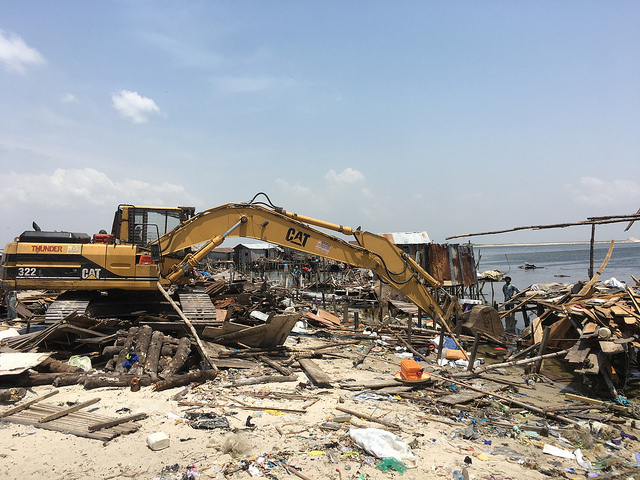The Nigerian Slum / Informal Settlement Federation (Federation) and the Justice & Empowerment Initiatives Nigeria (JEI) have condemned the demolition and forced eviction of the Otodo Gbame community, an act believed to have been carried out by the Lagos State Government, albeit on Friday, March 17, 2017.

The groups, in a statement made available to EnviroNews on Monday, March 20 2017, stated that the demolition was executed “in brazen disregard for a subsisting order of court prohibiting the eviction of Otodo Gbame and other Lagos waterfronts”.
According to the Federation and JEI, around 8am on the fateful day, residents of Otodo Gbame – an ancestral, predominantly Egun fishing settlement in Lekki – spotted excavators by the entrance of their community. Community members were then said to have notified their legal counsel at JEI and proceeded to approach the demolition squad said to be led by the Lagos State Task Force, who said they were on orders from the Lagos State Governor, accompanied by Military Police and the Nigerian Security and Civil Defense Corps who said they were under orders from the Lagos State Commissioner of Environment.
Community members, and later their counsel from JEI, presented documents evidencing a court order from the Lagos State High Court enjoining the government from demolishing their community. But the demolition squad turned a deaf ear, allegedly saying: “This is Lagos State. We don’t care about court orders; take it to the Governor.”
The demolition squad, JEI noted, presented no court order or other document authorising the demolition.
The statement reads: “Facing an imminent threat of unlawful forced eviction, the community members bravely attempted to form a human shield to peacefully stop the excavators from entering the community. Security forces then, reportedly, started firing tear gas and live bullets to disperse the crowd. Residents had no choice but to flee and begin scrambling to salvage what possessions they could.
“The demolition squad began demolishing their homes using three excavators, one of which was a “swamp buggy” specially contracted by the State Government to demolish all the structures built on water – a traditional building technique used by Egun fishing communities along the Lagoon. Later in the day, a fourth excavator joined the squad. Two ‘Black Maria’ mobile detention vehicles were on site throughout the demolition as a warning against any resistance.
“By early evening, all the homes and businesses built on land had been destroyed, rendering an estimated 4,698 residents – including children and the elderly – homeless in a matter of hours. There was no prior notice, no consultation, and no alternative shelter or resettlement offered.
“It will be recalled that the threat to the Lagos waterfronts began when Lagos State Governor Akinwunmi Ambode announced to the media on 9 October 2016 the government’s intention to ‘start demolishing all shanties on waterfronts across the State within seven days.’ Based on mapping and profiling done by the Federation in informal settlements across Lagos, we believe at least 40 communities and over 300,000 residents fell under this threat of imminent eviction.
“Accordingly, more than 20 Federation member communities joined together to write to Governor Ambode calling for retraction of the threat and requesting for dialogue to explore alternatives to eviction. Two peaceful protests brought thousands of waterfront residents to the gates of the Governor’s office and the State House of Assembly, but to no avail. To the contrary, the Lagos State Government proceeded to demolish Ilubirin on 15 October 2016. Finally, the threatened waterfronts had no option but to proceed to court to enforce their fundamental rights.
“On 7 November 2016, Honourable Justice S. A. Onigbanjo of the Lagos State High Court granted an injunction restraining the Lagos State Government and the Nigerian Police Force from proceeding with any demolition of the waterfronts. Despite this order, on 9-10 November 2016, Otodo Gbame community was demolished and over 30,000 residents forcibly evicted by arson attack and an excavator that began working in the dead of night while residents were sleeping.
“The November demolition of Otodo Gbame has been broadly condemned as a forced eviction and a gross violation of human rights, including by the United Nations Special Rapporteur on Adequate Housing, Amnesty International, and countless others.
“On 26 January 2017, Honourable Justice Onigbanjo delivered a landmark ruling in the case brought by waterfront residents. His Lordship found that demolitions on short notice without provision of alternative shelter constitute cruel, inhuman and degrading treatment in violation of the right to dignity enshrined in Section 34 of the 1999 Constitution of the Federal Republic of Nigeria and Article 5 of the African Charter on Human and Peoples’ Rights. Rather then entering final judgment, Honourable Justice Onigbanjo then ordered the parties to attempt mediation through the Lagos State Multi-Door Courthouse and ordered them to maintain the status quo – refraining from any evictions – during the pendency of the mediation and the suit.
“With the ongoing litigation and the protection of the court order, a fraction of Otodo Gbame evictees whose homes were demolished in November 2016 were able to rebuild, providing themselves with basic shelter from the elements and spaces in which to carry on their livelihoods.
“These are the homes and business that were, once again, brutally and unlawfully demolished by the Lagos State Government on 17 March 2017 – just a week after the waterfront communities was sitting in a mediation session with the government to try to discuss alternatives to eviction.
“We condemn such impunity and brazen disregard for the rule of law, which is incongruous with a democratic society and Lagos’s aspiration to be a center of excellence and global megacity.”
